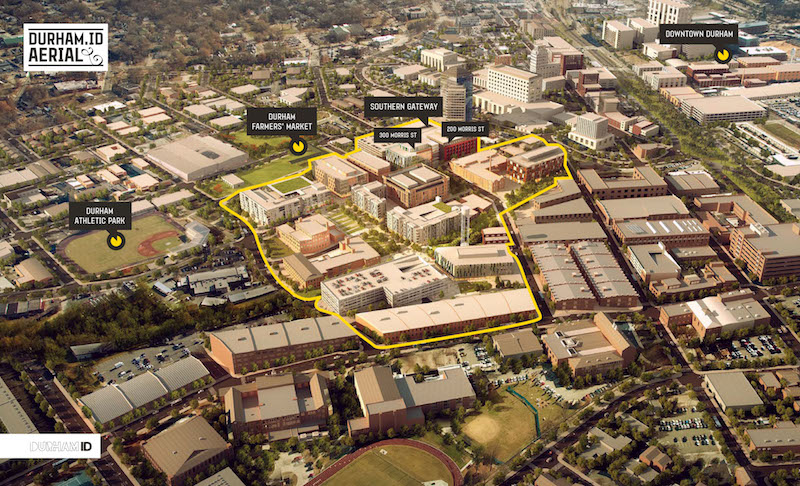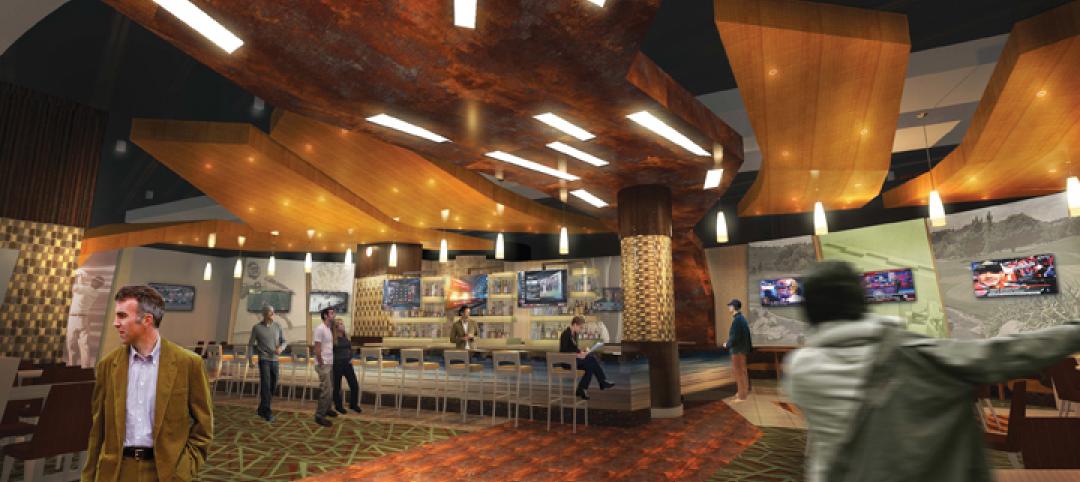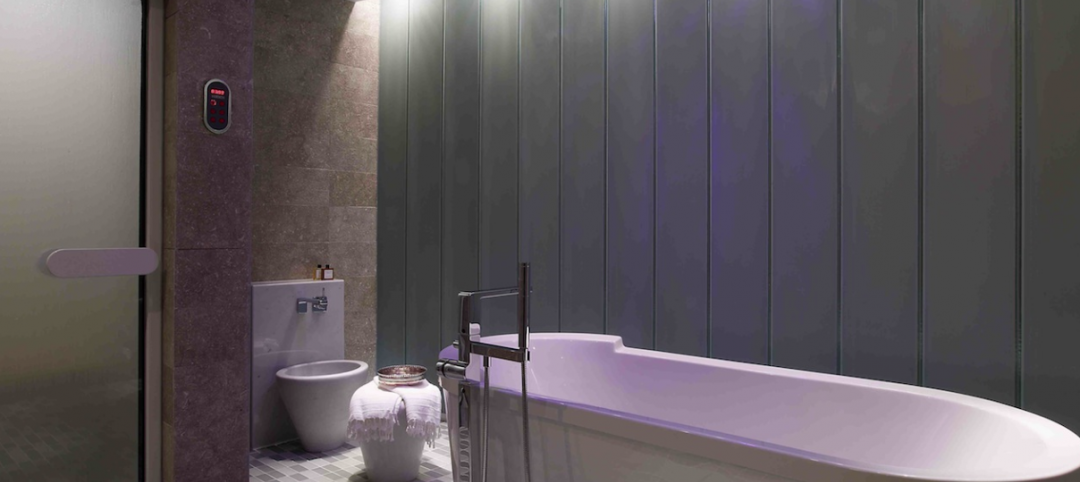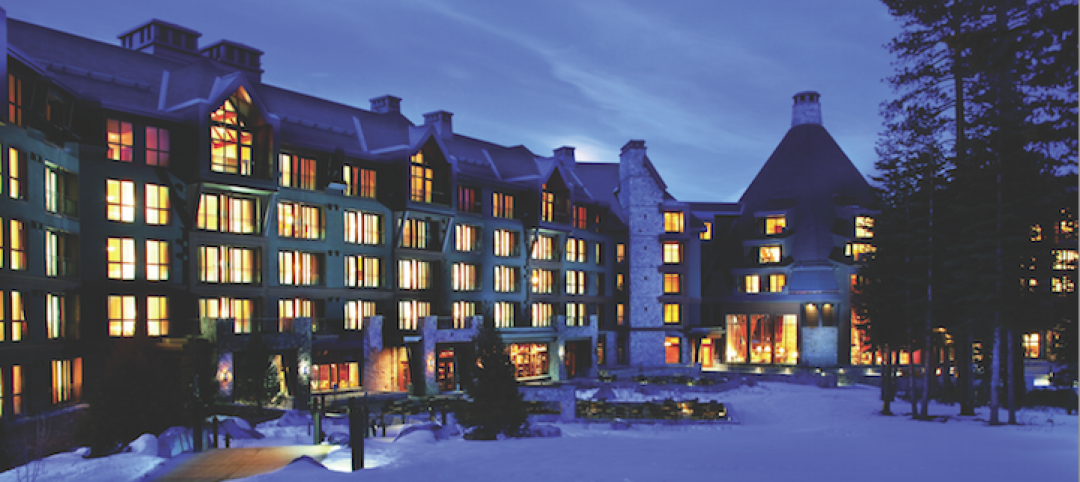The 15-acre Durham (N.C.) Innovation District, envisioned as a 1.7-million-sf mixed-use neighborhood within six blocks near that city’s downtown, is moving forward after opening two new office buildings with a total of 320,000 sf last December.
Stewart, which is providing landscape architecture, urban design, engineering, surveying and construction inspection and testing services for this project, is currently working with Greystar Real Estate Partners on a 300-unit, 250,000-sf residential building with ground-floor retail space, according to George Stanziale, Stewart’s president and director of design. Construction is expected to begin on this project in late third quarter of this year.
Boston-based Longfellow Real Estate Partners, the District’s owner and developer, is building a 175,000-sf full-service lab that should be completed in early 2020; and a parking garage that will be attached to an existing 1,200-car garage, says Jessica Brock, a Partner at Longfellow.
So far, Longfellow—which also owns an estimated two million sf of office space in Durham and Research Triangle Park—has invested in excess of $200 million in the buildout of the Durham Innovation District that is expected to take between five and seven years to complete. This redevelopment is being funded privately.
This is Longfellow’s first ground-up redevelopment. Brock says the city and county are investors in this public-private partnership, and the master plan took 2½ years to hammer out. While the District is heavily focused on R&D, “we also wanted it to be welcoming,” with wider streets, open and green spaces, and restaurants.
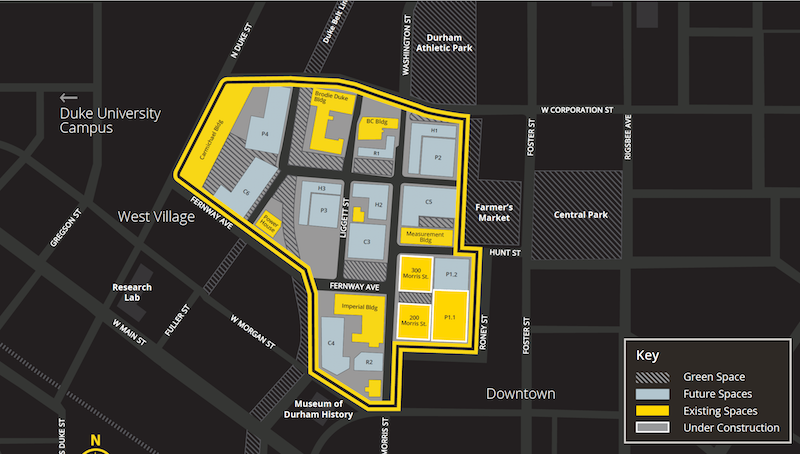
New lab space, a parking deck, and a 300-apartment building are in the works at the District. Image: Durham Innovation District, courtesy of Longfellow Real Estate Partners.
Durham has specific guidelines for its streetscape, but Longfellow wanted the District’s neighborhood to have a more contemporary look, which would have required an ordinance. Its designation as an official district of the city allows the District’s focus on innovation and creativity to be reflected in its design, including the incorporation of modern street furniture, from benches and tables to bike racks, tree grates, and trash receptacles.
Durham Innovation District, when completed, would include several parking lots and decks, and 10 buildings, including several existing buildings that already have been redeveloped and repurposed. Stanziale says that Hank Scherick, president of Measurement Incorporated—which develops, writes and grades standardized tests for schools—had been assembling downtown properties for years. Five years ago, Longfellow and Duke University (which already was a major presence in Durham) entered into discussions with Scherick about maximizing the potential of this site with a district that would focus on life sciences within a mixed-use context.
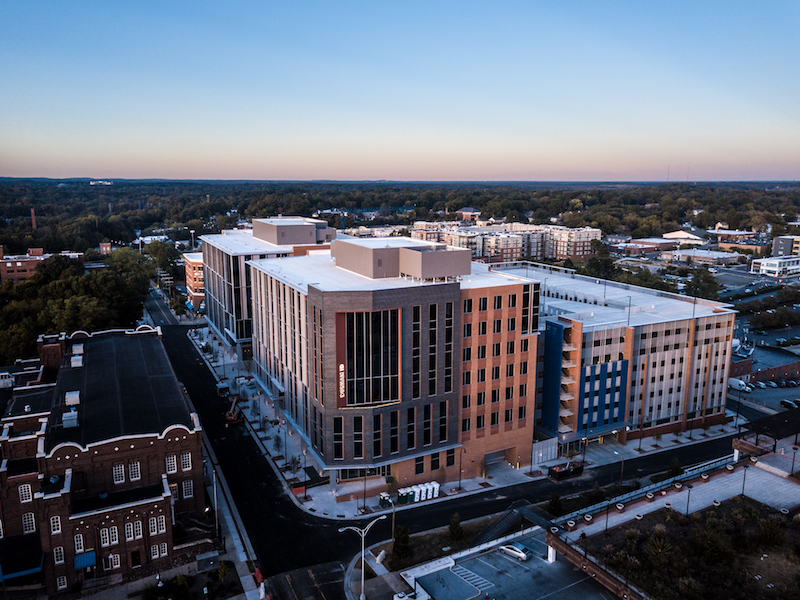 200 and 300 Morris Avenue, the addresses for two office buildings, each 160,000 sf, that opened in December within the District. Image: Durham Innovation District, courtesy of Longfellow Real Estate Partners
200 and 300 Morris Avenue, the addresses for two office buildings, each 160,000 sf, that opened in December within the District. Image: Durham Innovation District, courtesy of Longfellow Real Estate Partners
CBT Architects led the original master plan, and Longfellow brought in Stewart “to mold that plan,” says Stanziale. The site’s Carmichael Building, a former tobacco warehouse built in 1926, underwent a complete makeover to become a 115,000-sf office and lab space that’s leased mostly by Duke-affiliated institutes (such as the Duke Molecular Physiology Institute), and grant-supported programs.
Other buildings within the District have also been upgraded or redeveloped. They include The Measurement Building, whose five stories now feature 65,950 sf of Class A office space above 13,100 sf of street-level retail and 12,100-sf of below-grade parking. (Choate Construction was a contractor on this reconstruction.) The Brodie Duke Building, a former tobacco warehouse that dates back to 1878, offers 100,000 sf of space.
One of Brodie Duke’s tenants is Duda|Paine, which designed the District’s two new office buildings: 200 Morris Avenue and 300 Morris Avenue. (Barnhill Contracting was the GC on the new builds.) WeWork recently agreed to lease 80,000 sf on three floors in 300 Morris Avenue. Duke Clinical Research Institute leases all 160,000 sf of 200 Morris.
The old BC Building within the District has been redeveloped for 60,000 sf of new space. Another old warehouse, the Imperial Building, has been redeveloped for 125,000 sf of space whose tenants include the Duke Innovation and Entrepreneurial Initiative.
Related Stories
| Jan 19, 2011
San Diego casino renovations upgrade gaming and entertainment
The Sycuan Casino in San Diego will get an update with a $27 million, 245,000-sf renovation. Hnedak Bobo Group, Memphis, Tenn., and Cleo Design, Las Vegas, drew design inspiration from the historic culture of the Sycuan tribe and the desert landscape, creating a more open space with better circulation. Renovation highlights include a new “waterless” water entry feature and new sports bar and grill, plus updates to gaming, poker, off-track-betting, retail, and bingo areas. The local office of San Francisco-based Swinerton Builders will provide construction services.
| Dec 17, 2010
Vietnam business center will combine office and residential space
The 300,000-sm VietinBank Business Center in Hanoi, Vietnam, designed by Foster + Partners, will have two commercial towers: the first, a 68-story, 362-meter office tower for the international headquarters of VietinBank; the second, a five-star hotel, spa, and serviced apartments. A seven-story podium with conference facilities, retail space, restaurants, and rooftop garden will connect the two towers. Eco-friendly features include using recycled heat from the center’s power plant to provide hot water, and installing water features and plants to improve indoor air quality. Turner Construction Co. is the general contractor.
| Dec 17, 2010
Toronto church converted for condos and shopping
Reserve Properties is transforming a 20th-century church into Bellefair Kew Beach Residences, a residential/retail complex in The Beach neighborhood of Toronto. Local architecture firm RAWdesign adapted the late Gothic-style church into a five-story condominium with 23 one- and two-bedroom units, including two-story penthouse suites. Six three-story townhouses also will be incorporated. The project will afford residents views of nearby Kew Gardens and Lake Ontario. One façade of the church was updated for retail shops.
| Dec 2, 2010
GKV Architects wins best guest room design award for Park Hyatt Istanbul
Gerner Kronick + Valcarcel, Architects, PC won the prestigious Gold Key Award for Excellence in Hospitality Design for best guest room, Park Hyatt Macka Palas, Istanbul, Turkey. Park Hyatt Maçka Palace marries historic and exotic elements with modern and luxurious, creating a unique space perpetuating Istanbul’s current culture. In addition to the façade restoration, GKV Architects designed 85 guestrooms, five penthouse suites, an ultra-hip rooftop bar, and a first-of-its-kind for Istanbul – a steakhouse, for the luxury hotel.
| Nov 16, 2010
CityCenter’s new Harmon Hotel targeted for demolition
MGM Resorts officials want to demolish the unopened 27-story Harmon Hotel—one of the main components of its brand new $8.5 billion CityCenter development in Las Vegas. In 2008, inspectors found structural work on the Harmon didn’t match building plans submitted to the county, with construction issues focused on improperly placed steel reinforcing bar. In January 2009, MGM scrapped the building’s 200 condo units on the upper floors and stopped the tower at 27 stories, focusing on the Harmon having just 400 hotel rooms. With the Lord Norman Foster-designed building mired in litigation, construction has since been halted on the interior, and the blue-glass tower is essentially a 27-story empty shell.
| Nov 3, 2010
Rotating atriums give Riyadh’s first Hilton an unusual twist
Goettsch Partners, in collaboration with Omrania & Associates (architect of record) and David Wrenn Interiors (interior designer), is serving as design architect for the five-star, 900-key Hilton Riyadh.
| Oct 6, 2010
From grocery store to culinary school
A former West Philadelphia supermarket is moving up the food chain, transitioning from grocery store to the Center for Culinary Enterprise, a business culinary training school.
| Sep 30, 2010
Luxury hotels lead industry in green accommodations
Results from the American Hotel & Lodging Association’s 2010 Lodging Survey showed that luxury and upper-upscale hotels are most likely to feature green amenities and earn green certifications. Results were tallied from 8,800 respondents, for a very respectable 18% response rate. Questions focused on 14 green-related categories, including allergy-free rooms, water-saving programs, energy management systems, recycling programs, green certification, and green renovation.
| Sep 13, 2010
Conquering a Mountain of Construction Challenges
Brutal winter weather, shortages of materials, escalating costs, occasional visits from the local bear population-all these were joys this Building Team experienced working a new resort high up in the Sierra Nevada.


